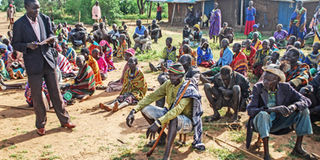Government rolls out elderly grant in all districts

Sensitisation. Some of the Sage beneficiaries attend a meeting at Ngoleriet Sub-county in Napak District in 2017. PHOTO BY MUDANGHA KOLYANGHA
What you need to know:
- Change. But senior citizens from the newly accommodated districts have to be 80 years and above to benefit as opposed to 65 years.
Elderly persons in Uganda have expressed concern over the adjustment of the age for beneficiaries of the senior citizens’ grant under government’s Social Assistance Grant for Empowerment (Sage) programme.
The Ministry of Gender, Labour and Social Development, while marking the International Day for elderly in Kumi District on Tuesday, announced the roll out of a national scheme of paying all elderly persons throughout the country.
In the new development, senior citizens from the newly accommodated districts have to be 80 years and above to benefit from the Shs25,000 monthly pay as opposed to 65 years from the 61 districts that have earlier been benefiting.
“This is how it was all resolved at Parliament and nobody should again come to ground to demobilise this programme,” the Gender minister, Ms Janat Mukwaya, told the gathering at Kumi Boma grounds on Tuesday.
She said more than Shs32b has been set aside by government to implement the national roll out, which is said to benefit at least 35,000 elderly persons throughout the country.
However, Rev Joram Tibasiima, the national chairperson of the Elders Forum, faulted government for raising the age of pay, saying it is discriminatory to the newly enrolled districts.
“This is a clear expression that government is looking at older persons as a spent force, as we look at how hard life is for older persons in villages, waiting up to 80 years to benefit is simply mockery,” Rev Tibasiima said.
He also expressed fear of the sustainability of the grant.
“We are already aware that there is a shortfall of Shs29.89b and the budget is only catering for six months. Beyond that, the access to these funds is also difficult as many older persons do not have National Identity Cards, as National Identification Registration Authority’s technology in most cases fails to read thumb prints of older persons hence many have ended up without IDs,” Rev Tibasiima said.
Grievances
He said government has also failed to enrol the older persons in a number of government programmes and has continued to give them empty promises.
“Last year, President Museveni gave a directive to give older persons Shs10b but to date, this money has not been realised,” the chairperson said. He said there are currently 60 Saccos for the elderly across the country that are awaiting funding.
“We are trying our best just like other special interest groups, but we always find ourselves being left behind,” he noted while asking government to give a directive to Operation Wealth Creation programme to include elderly persons.
Rev Tibasiima also tasked government to create slot for elderly representation in Parliament.
Kumi Municipality MP Silas Aogon supported the idea, saying it would help older persons present their views directly to Parliament.
“If we can have 10 army representatives in Parliament, why can’t we have an MP for older persons,” he said.
Key role
Vice president Edward Kiwanuka Ssekandi, who was chief guest, promised to present the issues raised to President Museveni.
“I owe you my love, so I will deliver all you have presented to the President as it is always my duty,” he said.
[email protected]




